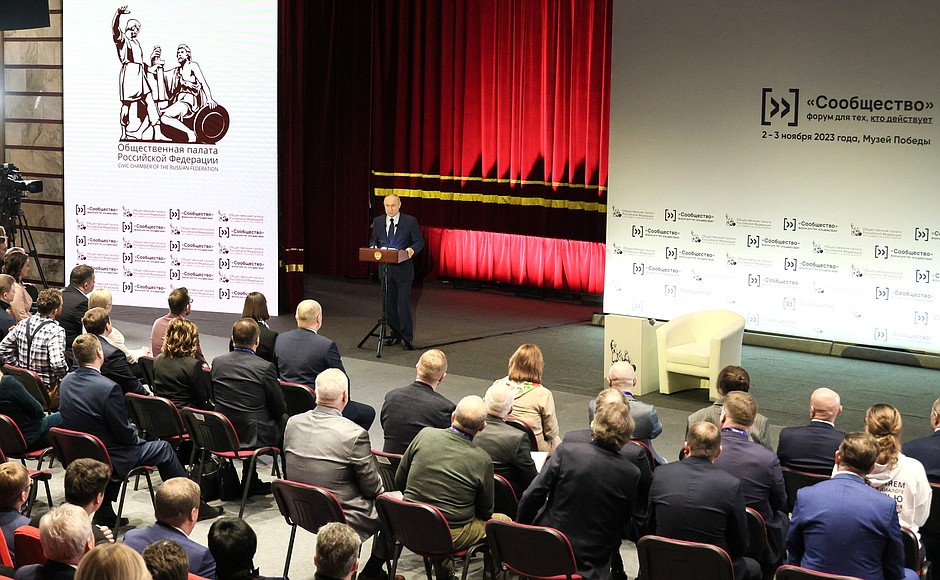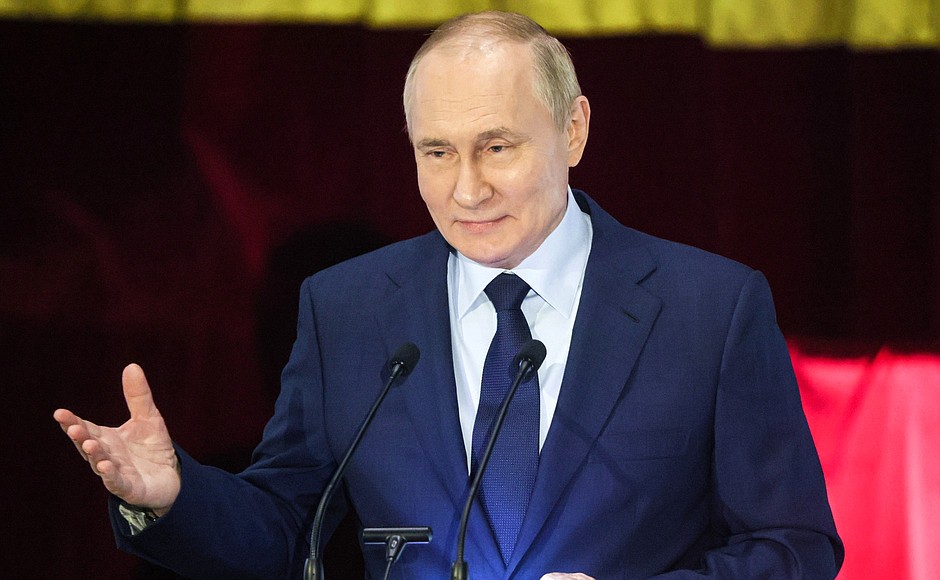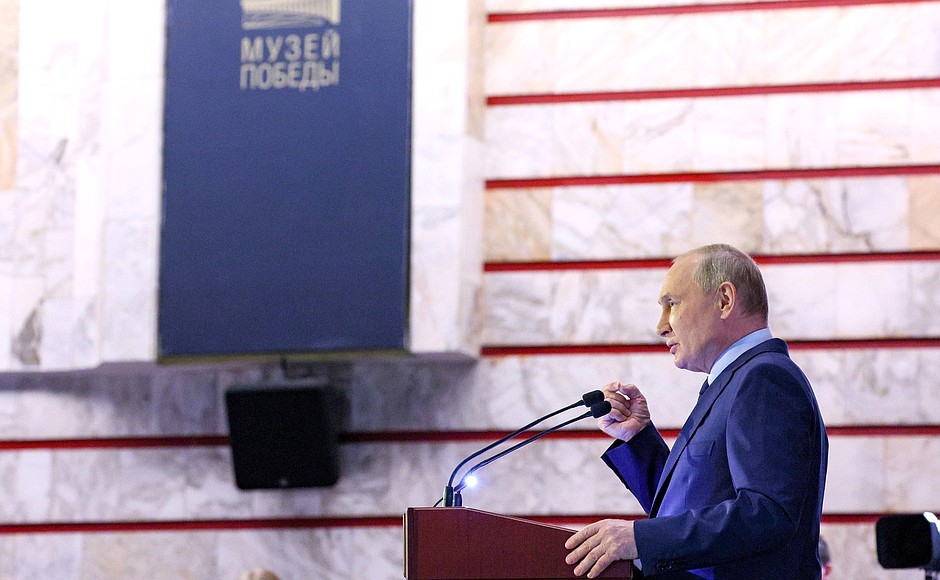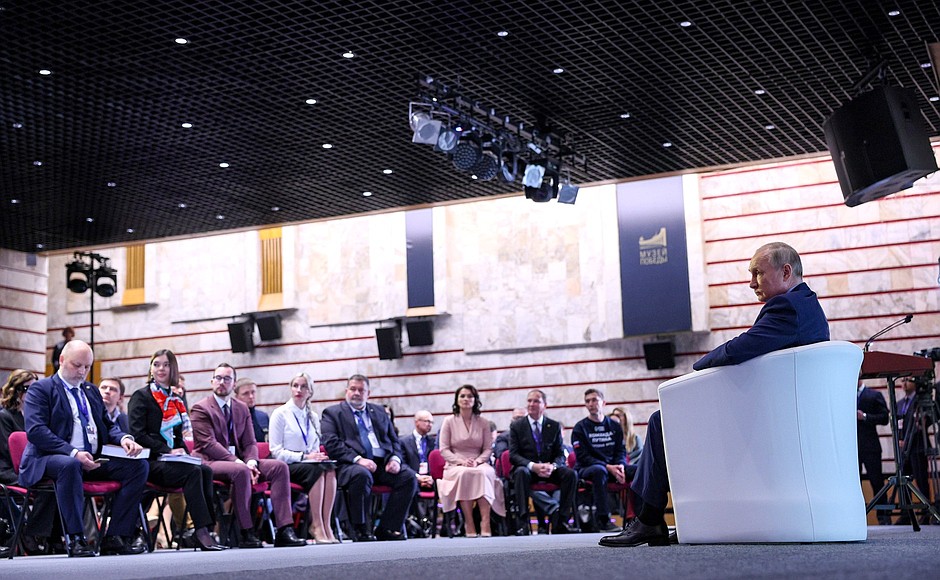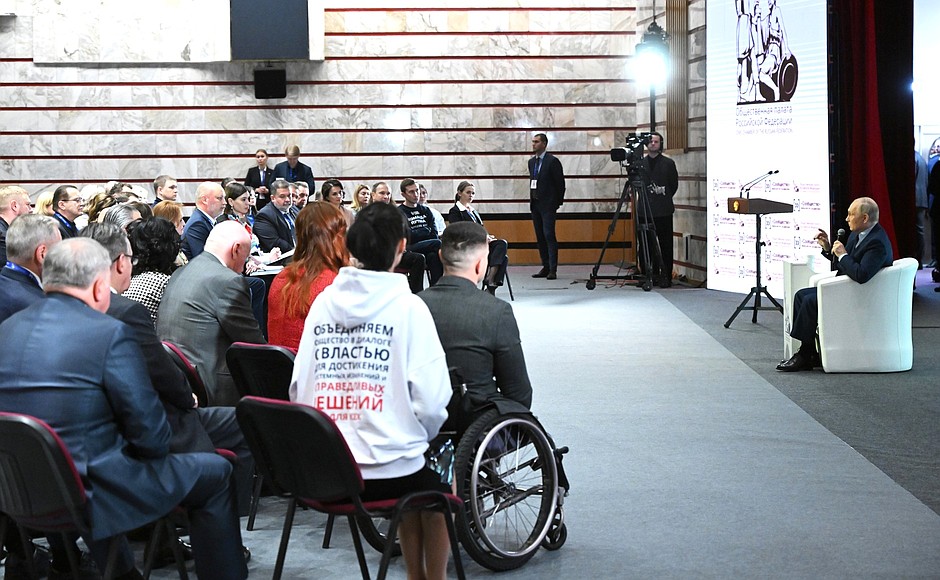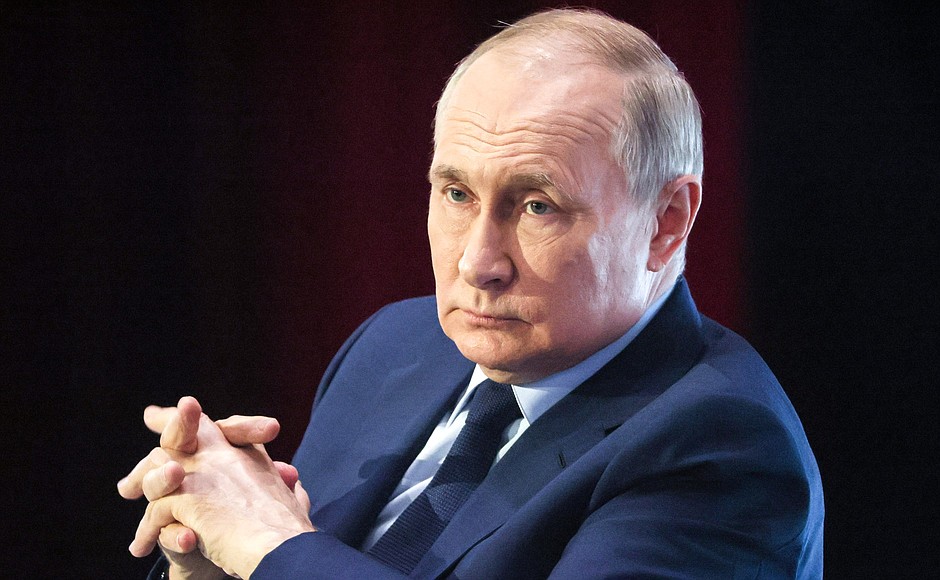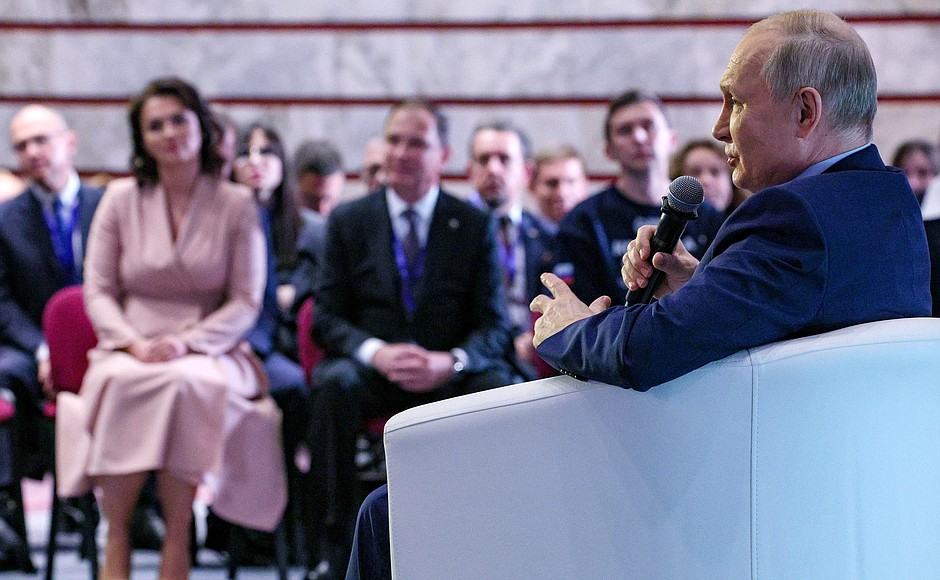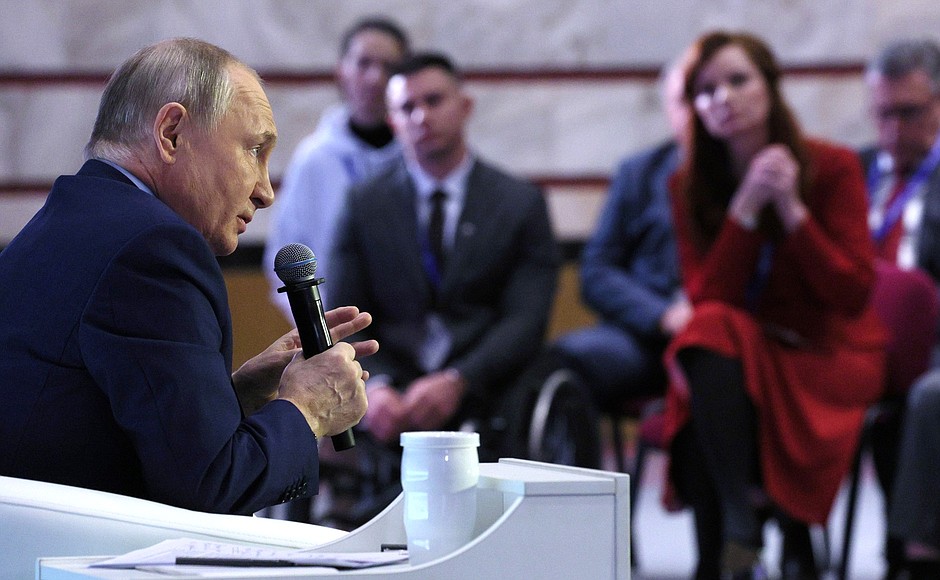For the first time, the Civic Chamber includes representatives of the country's new constituent entities – the DPR, the LPR, the Zaporozhye and Kherson regions.
* * *
Excerpts from the transcript of the meeting with Civic Chamber members
President of Russia Vladimir Putin: Good afternoon, friends and colleagues.
Our meeting is taking place on the eve of a holiday that means so much for our country. Its very name – National Unity Day – carries so much meaning. First, I would like to congratulate you, and all people of Russia, on this holiday.
This holiday commemorates the events that took place relatively recently, some 400 years ago, and 400 years is five or six generations. Time flies so fast. Just five or six generations, and so many events have taken place in the history of our country during this time, and the unity of our people has always been key to enabling Russia to reach new frontiers at all the turning points.
It has always been this way. Let's recall the days of, say, Prince Alexander Nevsky. He traveled to the Horde, bowed to the Khan and obtained a yarlyk [Khan’s edict] for his reign, primarily to be able to effectively resist the invasion of the West. Why? Because the Horde, arrogant and cruel as it was, never threatened our greatest treasure – our language, traditions, and culture, something the Western conquerors were eager to suppress. And this is the most important thing, because if a nation’s culture, traditions, and history are destroyed, the group will gradually begin to disappear as an ethnos, will melt like snow in late spring.
Why is Alexander Nevsky one of the most revered saints in Russia? Because of that policy choice he made. He thought about preserving the Russian people as a nation, and later supported all other communities living in our vast country.
In many ways, the same thing is happening today, when we say that we are defending our moral values, our history, our culture, our language, including by helping our brothers and sisters in Donbass and Novorossiya to do the same. This is the key to today’s events.
I am very grateful to the members of the Civic Chamber for consistently taking this approach and understanding what is happening. I know that many members of the Civic Chamber are under sanctions – which is a sign that the enemy actually appreciates what you are doing for Russia. I would like to thank you for this.
A great number of things happen in your work and ours that may seem pro forma at first glance but are actually very significant. By this I mean, for example, presidential grants in different areas: about 125 billion rubles in years past. If we add up state support and the funds raised by various public organisations for their projects, it will amount to 125 billion rubles that, one way or another, have affected the lives of 15 million citizens in this country. It is something that people need and feel, and something that provides tangible help for our society. I believe even more will be done.
I particularly want to thank you for the work you are doing jointly with the Defenders of the Fatherland Foundation taking care of the families of our military personnel and of the people who were wounded during the special military operation. It is an extremely important area of activity, and it highlights our deep respect for the people who are not afraid to act in the extremely challenging and difficult conditions of a military combat, who risk their lives, their health for the sake of Russia and its interests.
Of course, I would like to ask you to continue this work, including with local and regional government bodies. I always talk about this when I meet with my colleagues who have different areas of responsibility.
There is a lot of work to do. Mostly, it is well organised but, surely, considering the scale and complexity, there may be issues that require particular attention. Let’s discuss them.
Thank you.
<…>
Vladimir Putin (commenting on the remarks by Civic Chamber Secretary Lidiya Mikheyeva, who talked about the chamber’s work and projects; in particular, she elaborated on its international activities): Everything that concerns our international activities is important. You have just said that someone wanted to expel us from yet another organisation, but then they didn’t.
You know, the stronger we are economically, militarily, and in domestic policy, the less desire there will be for anyone to exclude us from anywhere.
We were excluded, and our energy resources were abandoned. So, what is the result? This year our GDP growth will be 2.8–2.9, or even 3 percent, while the leading economies of Europe will see a decline, a small one, but still. And they are suffering, and facing real problems. We are not happy about this; we are simply stating a fact.
And in military terms too. ”We must defeat Russia on the battlefield.” Now they are chanting and speaking differently. This does not mean that we should behave aggressively. This means that we must be sovereign and independent in every sense of the word.
This means that the economy and real production, which must be connected with the world economy – of course, there is no other way in today’s world; it must be self-sufficient in key components, so that the country not only survives but thrives.
Like becoming a country where 43 percent of our economic growth structure is processing and manufacturing industries, or no longer being told, as we were once pointed at and told, that we are “a gas station, not an economy;” when all this changes and when we become self-sufficient, then there will be fewer people who want to exclude us from any organisations, and there will be more people who want to apologise and invite us to work together in various areas of activity.
Therefore, we need to focus on the domestic agenda, address the problems facing us, move forward, develop, strengthen demographics, and, of course, strengthen our domestic policy.
<…>
Member of the of the Civic Chamber of the Russian Federation and the Civic Chamber of the Zaporozhye Region Vladimir Rogov: Greetings, Mr President,
To begin with, I would like to thank you for the historic decision you made giving us the possibility to return home. It is hard to describe the emotions which overwhelm us, residents of historic Novorossiya, because we were waiting for a long time, we were struggling for it, we wanted to return home, because for 30 years separatists broke us off from Greater Russia and did not ask if we wanted to live across the border from our families and friends in Greater Russia.
The point is that I come from the city of Zaporozhye which is occupied by a gang of drug addicts and Nazis at the moment. You see, when other locals learnt that I would attend a meeting with you and theoretically would have a chance to speak to you, they wanted to relate to you that the city of Zaporozhye is waiting for Russian troops. This is what Zaporozhye residents say.
Clearly, they are incapable to act openly, nevertheless, in the liberated part of the Zaporozhye Region people actively joined efforts to support the army, to support each other following the principles “Russians Help Russians”, and “Everything for the Front, Everything for Victory.”
Our academic community got involved in designing electronic warfare equipment and are landing enemy’s drones, kamikaze drones carrying explosives and other things.
Ordinary women tailor camouflage robes, knit camouflage nets and do other things so as to advance victory and liberate their native land as soon as possible.
You know, the region began to transform after it came back home, it became evident very soon: the roads now are so good, unlike anything we had seen before. Those who return after years of absence ask: Is this really the Zaporozhye Region? There are no potholes in the roads, you can drive fast and easy. People understand what Russia is and the opportunities it offers. Work with the local population in our regions is ongoing.
I would like to thank you also for the opening of the Russia – My History centre, which is really essential. You spoke about history. History is a science that we gained through suffering because we had been told for a long time about ancient Ukrs, about the Black Sea they had dug out and other things, all that nonsense that was used for years to brainwash us.
A very important issue is interaction with people, an open dialogue that we manage to maintain, thank God, on the platform of the Civic Chamber of the Russian Federation and the region’s Civic Chamber.
We have also instituted a Coordination Council on the new regions’ integration which is not limited to a single region. We have more or less similar or related problems. The coordination council also monitors prices and tariffs.
Let’s face it – businesses sometimes want to make extra money. We keep the monitoring and raise questions so that they remember that this is a two-way road – not only towards profits but also towards special responsibility. In collaboration with the authorities, we managed to reduce fuel prices. Even the highest prices during the peak were more than 2.5 times lower than, for example, in the city of Zaporozhye which so far remains under Kiev’s control.
Here I would like to ask you, Mr President, to issue instructions or give your consent, if possible, so that, working directly with people on site, we can prepare comprehensive monitoring on a quarterly basis of the local situation in society, that is, the observance of civil rights and social issues; so that we could actively work on upbringing and education. There is a large amount of work that we, as part of society, are ready to take on and help regional and federal authorities to faster establish a peaceful life.
As a Zaporozhian, I feel a colossal responsibility when all of Russia is helping us. I would like all this help to be used as effectively as possible, and for us to move closer to our common victory as quickly as possible.
One more thing, which I would also want to thank you for. You are familiar with the work of Nikolai Danilevsky, our great Russian scientist, and have quoted him more than once. By the way, every time you quote him, this inspires many people to turn to his scholarly contributions, believe me.
This man described the events that are now happening in our country in his book “Russia and Europe” 150 years ago. See, we have been under heavy pressure and suppressed for 30 years on the southern Russian lands; they banned our native Russian language and tried to explain to us that we are not Russians. That is, according to Danilevsky, we were turned into ethnographic material from which you can mold anything you want and say that’s it, you’re not Russian. Nevertheless, we remained faithful to both our memory and the memory of our ancestors and know very well that we are Russians.
Here, talking to a large number of people, we help them rehabilitate from this sect of political Ukrainisation. This is really a psychiatric disease when people are forced to believe something that is not actually true.
I would like to make a proposal. We, a large team of comrades and people concerned about the future of our great Motherland, have an idea – to create a Danilevsky centre, perhaps at the premises of the Russia – My History centre, because we have already gained a lot of practical experience in returning brain functioning to people crushed and turned into ethnographic material. We help such people to come to their senses, to start functioning normally, to create. Because being creative is the natural state of a Russian person.
Believe me, we, people living in the southern part of Russia, which was cut off from its roots for 30 years, are, in fact, a storehouse of the Russian people’s historical forces, which was mothballed and could not make any efforts to regenerate our great Russia.
I would like to use this opportunity to present you with a book; we have published the first volume of the collected works of Nikolai Danilevsky. But this is not just a reissue: it involves a creative rethinking of the mass of people who work with it as applied material.
Thank you a lot.
Vladimir Putin: Thank you very much. Thank you for the book.
You know where I would like to start, in response to your proposal and your statement. First of all, we all know very well – these are the facts of history – that all, as you said, the South Russian lands were given to the Soviet Ukraine during the formation of the Soviet Union.
There was no Ukraine as part of the empire, there were regions, and it came in the 16th century, Ukraine, consisted of three regions: Kiev and the Kiev region, Zhitomir, Chernigov – that's all. It came from the Polish-Lithuanian Commonwealth, from Poland voluntarily. We have a letter in our archives – I have already mentioned it – we, the Russian Orthodox people, appeal to Moscow, to the Tsar, and so on. In an attempt to defend our rights, we addressed the same letter to Warsaw: we, the Russian Orthodox people, ask to preserve this and that, demand, and so on.
Then what happened happened. They started to form the Soviet Union and created a huge Ukraine, and primarily and to a large extent at the expense of the South Russian lands – all the Black Sea region and so on, although all these cities, as we know, were founded by Catherine the Great after a series of wars with the Ottoman Empire.
Ok, so it happened, modern Russia came to terms with it after the collapse of the Soviet Union. But when they started to exterminate everything Russian there – that is, of course, extreme. And in the end they declared that Russians are not an indigenous nation in these lands – it is a complete outrage, you know? And at the same time, they also started exterminating Russians in Donbas to the applause of the West.
As it turned out that, although they signed the so-called Minsk agreements for a peaceful settlement with us, they were not going to honour them, as it turned out later, and moreover, they publicly refused to honour them at all. And they also started dragging this entire territory into NATO – brazenly, without heeding any of our protests, without paying attention to our position, as if we did not exist at all. This is what lies at the centre of the conflict that is taking place today. This is the cause of this conflict.
Of course, if our relations with fraternal Ukraine (I still say ”fraternal,“ meaning that our ethnic composition is fraternal in the literal sense of the word) were normal, modern, friendly, it would not have occurred to anyone to take action, for example, related to Crimea.
How? If everything was fine there, if Russian people, the Russian language and culture were treated normally, if there were no coups, would it have occurred to anyone in Russia to act in Crimea the way we did? Of course not, we had to protect people from this Nazi scum. What were we supposed to do? They simply forced on us a choice where we could do nothing else but stand up in defence of the people living there. The same thing happened with Donbass and Novorossiya.
Of course, we need to do everything we can to ensure that the entry of these territories is smooth, natural, and that people feel the result as quickly as possible.
You know, we have many problems in Russia as well. We are fighting corruption in Russia, and they are fighting it all over the world. But the way Ukraine has been living under Ukrainian corruption, there is no such thing in the world, I assure you. There is nothing else like it in the world! You can believe me, I have been in close contact with former leaders. Payoffs for everything: for a vote in the Supreme Court, for a vote in the Constitutional Court. Payoffs. And when we discussed what to do, they would say: ”We will resolve this, it will cost this much.“ I was told this by the highest officials of the state. My jaw dropped. I said, ”That’s what it’s like here?“ ”Yes, just like that.“
Now they say that weapons from Ukraine are appearing in the Middle East. Of course, they are. They sell weapons. And they sell them to the Taliban, and from there weapons go anywhere else. Everything is bought and sold.
It is not by chance that I am saying this. Because people both in Novorossiya and Donbass lived in such conditions, everything there is saturated with this. We need to calmly implement our standards with respect for society, for those people who live there. Of course, I repeat, we ourselves have plenty of these problems. But the level is just completely different. Corruption is actually legalised there. Why do Americans try to fight this corruption but nothing works? I do not think it will work. They are now planning a change of elites – both economic and political one. Everything will remain the same.
But it should not be like that in our country. Yes, there are problems, but we should overcome them together and introduce things gradually, including Russian legal standards, just as we gradually did in Crimea. It is not easy to do. Switching to the Russian regulatory framework is not easy, either. But we will gradually do this and are already doing it.
You said that some things are changing outwardly. Yes, they are changing, and we have a programme to develop these territories, and significant funds have been allocated.
What would I like to say to all citizens of Russia, who live both in the new territories, as we say, and in those territories that form the basis of the Russian Federation? Of course, we have the right to expect from the state that it will act effectively and people will see the results of the country’s activity.
But it should be a two-way street. And people should also understand, including those living in the new territories, that, of course, they have the right to expect results, but we should work together so that the country as a whole actively develops in the right direction and at the pace at which we expect. That is, we need effective joint work.
In this regard, I certainly support you. In what matter? You said that you are going to monitor the actions of authorities, for example, in Zaporozhye, in the Kherson Region, in Donetsk. We definitely have to do this, we definitely have to get involved in this work.
You said: we are going to do this and that. I would even ask you to do this. Because oversight by public organisations is extremely important, including in light of what I said before. Because all the schemes designed earlier will not be cancelled by the fact that the referendum took place. You understand what I am talking about.
And so, we are sending funds, and we will send even more. The main thing is that, thank God, our economy is running smoothly, and everything is working out. We are not changing any of our plans, we are not abandoning any of our plans –either in the social sphere, or in terms of infrastructure development, in other areas: support for industry, security, and so on. But there are additional resources for the development of these territories, and they are significant. Of course, we need to monitor every step. I certainly ask you to do this.
As for establishing the Danilevsky Centre, this is a good idea. We should do that.
Thank you.
Head of the Spiritual Assembly of Muslims of Russia Mufti Albir Krganov: Colleagues, brothers and sisters.
First of all, I would like to express my sincere gratitude for the opportunity to speak at this important meeting of ours on the eve of our common holiday, National Unity Day.
Just recently we have witnessed how easily the flames of an external conflict can spread to our land.
Of course, we are deeply concerned about the events in the Middle East. Our multi-million Muslim ummah prays in mosques for justice to be restored.
But on October 29, Makhachkala was shaken by a cynical provocation engineered by those who want to incite ethnic hatred. It was obviously organised from the outside by the enemies of Russia and the enemies of Islam.
We reacted promptly, and on October 30 held an expanded meeting of the presidium of the Spiritual Assembly of Muslims of Russia with the participation of spiritual leaders of almost 30 Russian regions, including Daghestan. Following this meeting, we adopted a statement unequivocally condemning the reckless actions of the ignorant and also called for stopping the bloodshed in the Middle East immediately.
The country’s Muslims fully support the government’s efforts in this area. Muslims in Russia have lived side by side with Christians, Buddhists and Jews for over a thousand years. They share grief and joy, raise children and pray, and now they are defending our Motherland from our common enemy.
Just today I spoke with Mufti of Daghestan Akhmat-hadji Abdulayev. He told me that more than 35,000 true believers and patriots, Muslims from Daghestan, are fighting on the frontline. Together with representatives of Russia’s other ethnic groups, they are fighting against that spider that you have spoken about recently, which also kindled the fire of war in Palestine.
I do not presume to say, of course, how many of our military personnel are from Daghestan. But I would like to inform you that we are actively supporting Muslim servicemen who are fighting in the special military operation today, and we continue to promote our work together with the Defenders of the Fatherland foundation for the rehabilitation of fighters returning from the front.
When the Koran was burned in Europe and caricatures of the Prophet Muhammad were published, representatives of all faiths supported us, the Muslims, in Russia. When atrocities began against the Orthodox Church in Ukraine, we all united and also raised our voices. Prophet Muhammad, peace be upon him, said: everything changes for the better for those who trust in the Almighty and do good.
In this sense, we would like to note that today we do not have the right to allow attempts to rock our country on ethnic or religious grounds.
Mr President, colleagues,
I would like to say a few words about our joint efforts undertaken in this regard.
There are plans to build an interreligious centre in Novaya Moskva [New Moscow], which will become a unique platform for dialogue in terms of its potential and capabilities. This project will unite temples of four traditional religions of Russia: Christianity, Judaism, Buddhism and Islam. The complex will include an educational centre, museums, exhibition venues, and intellectual laboratories for each of our religions, as well as special spaces for youth leisure, creativity, gardening and sports.
Together with the Moscow Institute of Architecture, we added all this to the concept, considering last year’s meeting with you, Mr President, where you then noted that it is very important for us to work with young people.
Representatives of all religions support this wonderful project unanimously. The concept and models will be demonstrated at the “Russia” exhibition at VDNKh. We have been moving towards addressing this righteous work step by step, slowly and carefully, for 11 years, giving great consideration to public opinion. At the beginning of this year, thanks to the decision of [Moscow Mayor] Mr Sobyanin, we received the documents for the land plots. We plan to begin construction in 2024.
We believe that this project will become an important contribution to promoting interethnic and interreligious accord, as well as the embodiment of Russia’s civilisational path. We count on your support for this initiative, Mr President.
May the Almighty strengthen our unity in the face of these great common challenges.
Thank you very much.
Vladimir Putin: As for mosques, cathedrals, synagogues, datsans and so on, we have built as many such institutions in modern Russia as they have never built in the Soviet times.
Thousands of mosques have been built.
Albir Krganov: Eight thousand.
Vladimir Putin: Eight thousand mosques across the country. To be honest, when I talk to my friends and colleagues, say, from Arab countries, they do not believe it: “How many?!” I say: thousands, eight thousand. They cannot believe these numbers… Well, they do believe when I say it. (Laughter.) But overall, it sounds extraordinary, of course.
Nevertheless, this process continues, and it will continue for all our traditional faiths above all, because this is where people can find spiritual support. This is important for the state, and we will support it.
You will discuss specific issues with the Moscow Mayor; he knows my position.
Regarding these events in Makhachkala that you have mentioned, you know, it is very easy to strike a spark, considering the horrors happening there [in the Gaza Strip]; of course, it is easy to do. As I have already said at the meeting with my colleagues from the Security Council, when you see the suffering and bloodied children, your fists clench and tears well up in your eyes. I think this is the reaction of any normal person. If there is no such reaction, then this person does not have a heart, it is simply made of stone.
But, of course, we must look at all these events with a clear mind and see where the root of evil is and where it comes from. Are the Tats to blame for what is happening? Tats, by the way, are an indigenous people in the Caucasus. How long have the Mountain Jews been living there? Hundreds of years, maybe a thousand years, and they still do. Therefore, we just need to understand what is happening.
And, of course, they are doing this, as we know, from the social media; it was done by people who live abroad, including those in Ukraine.
In this regard, I am surprised, of course, by the position of the overseas “activists” who seem to support the Jews of Israel and are trying to organise Jewish pogroms in our country with the help of their agents from Ukraine. It is absolutely disgusting. And this is no longer double standards; I do not even know what to call it: some kind of moral perversion. This suggests that in fact they are more likely pursuing their own interests than the interests of some third parties and third countries, and in this case, their interest lies in fighting Russia and stirring things up in Russia from within. This is absolutely unacceptable in our multi-ethnic country.
Speaking about people from the Caucasus fighting in the special military operation, there are a lot of them and they are skilled and brave fighters. Moreover, people from the Caucasus are not all fighting in the rank of privates: believe me, I know what I am saying, they are in senior military positions in the Russian Army right in the special military operation zone and are fighting brilliantly.
What happened, happened. The response of the clergy was swift and firm. I would like to thank you for this. Especially because this is not the main trend in Daghestan, a region I have great love for, but an event we must pay attention to and react according to the Russian law. Of course, we will do this.
<…>
Vladimir Putin: (responding to the speech by Chairman of the All-Russian Student Rescue Corps Yevgeny Kozeyev) Thank you and everyone working with you and fulfilling this important mission. Please be more careful. I am also addressing members of the Civic Chamber. Please be very careful when you visit the combat zone or adjacent areas. Unfortunately, it is not safe for now. All in good time. I hope this time will come soon, but you need to be careful for now.
As for supporting volunteers, we have always done it. How can we not support those who voluntarily take on such an important mission as the implementation of crucial tasks facing the state and society and help people directly? We have supported them and will continue to do so.
Regarding the volunteer centres, if there is a need to support the creation of these centres, let us do that too. I will definitely tell my colleagues both in the Government and in the Presidential Executive Office.
Thank you.
<…>
Director of the non-profit Foundation for the Study of Problems of Democracy, political scientist Maxim Grigoryev: Over the course of many years, we have gathered data and created the International Public Tribunal for the crimes of Ukrainian neo-Nazis. There are civil society representatives from more than 30 countries participating. And over this time we have collected more than 700 testimonies in the combat zone, just during battles, including by survey.
My book, Ukrainian Crimes Against Humanity, has been published, and [Foreign Minister] Sergei Lavrov gave it to the UN Secretary-General. We know and understand what it is; we just continue this work at a new level.
If I may, perhaps I will make a wish. It would be very important if this book made its way to libraries, universities, and schools too, because it is not us who are saying this but the women we interviewed, children who were killed, shot at and tortured during this time.
And now, at the new stage… After my contacts with all these people, I made a personal decision to fight this evil with weapons in hand. (Maxim Grigoryev signed a contract with the Bars volunteer unit and is going to the special military operation zone.)
Thank you.
Vladimir Putin: This is a man’s choice. But you will need training, be careful.
<…>
Yekaterina Agranovich: Good afternoon.
Yekaterina Agranovich, media manager, blogger, member of the Civic Chamber.
I attended your meeting with war correspondents in June. I didn’t dare then, thought that it was a serious meeting, but later I really regretted it. So today I will do it: I would like to give you a book that my brother wrote.
This book is titled “Callsign: Matros,” and it is about the feat of our father and uncle, who have been fighting since 2014. My brother described their battle path. Now, unfortunately, my uncle was killed, and my dad has also been wounded many times, but he continues to fight, and right now he is near Avdeyevka, and everything is relatively all right with him. So, when you are in Donetsk, please come and visit us.
Vladimir Putin: Thank you.
Yekaterina Agranovich: And now about work. We have members of the Civic Chamber here who are in fact from the new regions or who have already settled there. Anna Revyakina is a poetess who publishes her own work and collections of military authors, and they are all bestsellers. Pyotr Lundstrem is a violinist who gave 115 concerts on the frontline, right on the line of contact. I myself attended several concerts, too. This, of course, raises the morale of military personnel.
Vladimir Putin: And where is the violinist?
What pieces do you play?
Pyotr Lundstrem: Mr President, mainly Bach and Paganini. And speaking about military songs, I can tell you that I am also skilled in artistic whistling. I like it very much. Otherwise, I play Bach. Yes, you would think, what does a German composer who lived so many years ago have to do with this?
You know, I also played for the Akhmat special forces. Everyone liked it; everything was fine. This is art.
Vladimir Putin: I am curious: when you play Bach and Paganini, how does the audience react?
Pyotr Lundstrem: They react in an absolutely amazing way. I played my first concert in April of 2022, and I had my doubts. But after that concert, there were no more doubts left. Moreover, I gave concerts together with Yulia Chicherina and Alexei “Django” Poddubny: you know, they are rock performers, and I was interested in how it would sound. But the audience’s reaction was just great.
And the most important thing: we come, look them in the eye, and say: we are of one blood, you and me. The creative intelligentsia – this term has already been discredited and we should say the creative class – must be close to the people just like any other class, and this is the way we are trying to prove this.
Vladimir Putin: I think that for people who live in very difficult conditions, when every day they see people either get wounded or killed, and they are in mortal danger in the most literal sense of the word, too, then, I think what you do – play these world-famous pieces of art (and music is a special type of art: it cannot be seen, it cannot be declared, it cannot be touched, but it touches your heart) – is probably very important for the people you do your best for.
Thank you very much.
Pyotr Lundstrem: Thank you, Mr President.
I do not have a question, but I just wanted to quickly pass on to you greetings from the front. I started to help and focused on helping the mobile reserve battalion of the DPR army, which is now part of the Russian army, and eighteen months ago they began to take the names of Orthodox saints. It all started with the Rus battalion, then the Alexander Nevsky and Dmitry Donskoy battalions, and now there are more than 20 units like this.
I am authorised to convey words of gratitude and full, unconditional support to you as the Supreme Commander-in-Chief.
And as I am talking about Orthodox units, I would also like to convey the greetings from the Hero of Russia, Major-General Apti Alaudinov, commander of the Akhmat special forces. I think you also referred to him when you were talking about servicemen from the Caucasus who hold senior positions. I also played for them. You know what Akhmat is. Huge words of gratitude and, excuse me once again, full and unconditional support come from them, too.
Thank you very much.
Yekaterina Agranovich: Pyotr also organises festivals for children called The Donbass Express, where children are taught the art of music.
<…>
Vladimir Putin: Someone raised a hand far away. There was a question or proposal on families with many children. Go ahead, please.
First Deputy Chair of the Civic Chamber Commission on Demography and the Protection of Family, Children and Traditional Family Values Pavel Pozhigailo: Good afternoon, Mr President.
Yesterday, Sergei Sobyanin [Moscow Mayor] conferred on my wife and me the Order of Parental Glory on your behalf. Thank you very much.
Vladimir Putin: Thank you for your attitude towards children. How many children do you have?
Pavel Pozhigailo: Eight.
Vladimir Putin: Eight. Excellent.
Pavel Pozhigailo: I have been dealing with the Civic Chamber Commission on Demography for six years now. Of course, we are concerned about the birth rate. During the past year, I have visited many regions, promoting my life style. We have many ideas on how to resolve this serious problem today.
But the main thing is that we have much food for thought. The Security Council decided on a National Security Strategy, and we have Executive Order No. 809 on the Protection of Traditional Values. But the problem is that the country does not have a body that is responsible for the execution of this law.
By all accounts, maybe it would make sense to draft a strategy on demographic security to develop the National Security Strategy because last year we lost a million people.
We need a body responsible for implementing all this. Maybe it is sensible to subject all laws adopted by the state to demographic control and monitoring. In other words, does this particular law increase the population or reduce it?
Yesterday, the Ministry of Labour and Social Protection and Healthcare Ministry said they adopted 700 demography related projects, stunning projects. I said – look, we have been dealing with the same problem for ten years, for instance, in Crimea. We checked one pharmacy together with the Healthcare Ministry. In one year, they sold 3,500 packs of medicines to stop pregnancy, while the statistics say there are 4,000 abortions in Crimea every year. Just imagine – one pharmacy sold 3,500 medicines, but the statistics point to 4,000 abortions. This is because private clinics do not release any figures. Last year, 1.2 million such medicines were sold in the country. Healthcare Ministry statistics show 400,000 abortions. If we add 1.2 million to this figure, we get 1.6 million.
Of course, the implementation of these 700 projects is not about spending budget funds. They are aimed at increasing the birth rate – this is the main point. The birth rate should exceed the death rate. It would be correct to make somebody responsible for everything that is happening with our demography. Naturally, we need strategic document that could systematically pool the efforts of all government structures for resolving this problem.
Vladimir Putin: You have raised a very serious question. I will not go into the details now, but it is complicated.
I know what our demographic declines are caused by; we have talked about this many times. In 1943, we had a demographic decline similar to 1991, with the birth rate at about the same level. This was the way the population reacted to the collapse of the Soviet Union: the planning horizon of a family shortened immediately.
The first thing I want to say. Of course, the problem of abortions is a pressing one. The question is what to do about it. Should we ban abortion pills? Or should we improve the socioeconomic situation in the country, the wellbeing, real wages, social assistance, provide young families with assistance to purchase housing, provide financial aid to young student families, and others? There are many areas of activity to support mothers with children. This is a crucial issue.
Overall, I think, and you will probably agree as the head of a big family, that the state has done a lot over the past few years to support families with children.
I agree with you that it is necessary to pay constant attention to this, to not stop working and respond to the new realities of our life. It is necessary to do this on a daily basis, each day to think and come up with new ideas.
Do we need a strategy on security in demography? Let me think. Everything that the state does is a strategy. Yes, it is necessary to focus our efforts somewhere, and the Government is doing that in the social bloc.
Nevertheless, my colleagues and I will review this because the issue is very important for the future of our state. You are absolutely right that this is one of the key issues, I totally agree.
I want to wish your big family happiness and good luck. Here’s what I want to say. When I meet with large families, you know what strikes me? I do not want to offend anyone, of course, we hope that all of us are good people, but believe me, parents of families with many children are especially kind. This is absolutely evident, it is striking.
Mothers are kind, naturally. But I am always amazed by fathers. We are always surrounded by cameras, and it is awkward to say some things, but nevertheless, I am constantly surprised by fathers. Honestly. They are very kind, calm, confident people who are very friendly and soft towards their children. This is a special attitude of fathers with big families. Children naturally bring a special sort of happiness. I sincerely wish your family all the best.
<…>
Member of the Civic Chamber, Rector of the Russian Institute of Theatre Arts – GITIS Grigory Zaslavsky: Thank you very much. When you stand up to speak, a lot of thoughts come at once. The first one is to thank you for the Presidential Certificate of Merit, which I have recently received.
And thank you for the instruction to work on the Zemstvo Cultural Worker programme, this is also important for us.
I understand that on February 24 the world changed completely and irrevocably; there were attempts to cancel culture and everything else.
I have a personal, almost childish question for you. If you knew how all this would play out, would you have made the same decision on February 24 or not?
Vladimir Putin: We had no other choice, because before you decide to uncover your rifle, you first need to think about whether you can do without it. No, unfortunately, this was not possible. Why? Because we had already been attacked.
We just remarked how these are our new but old territories; our historical territories where our people lived. All subsequent events showed – and my colleagues just said this publicly – that they considered themselves part of Russia from the beginning, but they were attacked in 2014.
First, they tried to attack Crimea, and then Donbass. And we have been working for eight years to resolve this situation through peaceful means. In the end we were told: we will not accept peaceful means. They refused them publicly: we won’t, they said; we don’t like the Minsk Agreements. And what were they going to do – hit them non-stop? It was necessary to take action at some point to put an end to this. This is what we strive for. This is what determines everything.
You know, let this be the final question. Yes, go ahead.
Civic Chamber member and Director of the Agency for Social Technology and Communications Yelena Rodionova: Thank you very much.
I want to thank you on behalf of the Civic Chamber’s section for preserving our historical memory, which met yesterday, for the creation of a National Centre of Historical Memory. Thank you very much. We were eagerly anticipating this for a very long time.
But, Mr President, we all understand that this is not about the past, this is about the future. The future is our younger generation. We always strive to treat them with respect.
I think we can borrow from the experience of our Belarusian colleagues in this respect. I have just been to Minsk and learned about a great practice that they have been implementing since 2014 – note, 2014! Every first-grader receives a gift edition of “I am a citizen of the Republic of Belarus.” This is not a postcard, or a manual or brochure. It is a gift. It looks beautiful and is very precious. It contains key information about the country.
Every young person receives a gift edition of “I am a citizen of the Republic of Belarus” at the age of 14 along with their passport. Every teacher receives a multimedia gift edition of “Belarus is a great country: Facts and figures.“
Let’s do the same in Russia. This will be very important.
Vladimir Putin: Yes, we must use the best practices, including those of our Belarusian friends.
Thank you for drawing attention to this and I think we will introduce this practice in Russia.
As for Belarus and Russia, I would include information about the Union State in this gift.
Go ahead, please.
Yelena Rodionova: Colleagues, we are on the eve of the Great Victory. It is a very important date for the entire country. Owing to the project “Without statute of limitations,” our youth have recently learned a lot of truth about past events, which is very important. Once again, we could use the experience of our Belarusian colleagues. In 9th and 10th grades, they have a manual, an academic course about the victory of the Soviet people in the Great Patriotic War. We do not make any distinctions, either. We have done a lot for peace all together.
Thank you very much.
Vladimir Putin: Thank you for the information.
Colleagues, please do not be cross but we must finish up this meeting.
I would like to thank you for your work as a whole and for this meeting. First, it took place in a positive atmosphere. Moreover, it was also useful because during it you discussed many important issues in our country and our work in major areas. I have made a note of almost everything. I will pass it along to my colleagues in the Executive Office and the Government, as I have already said more than once.
I hope for our continued cooperation in the future, and I hope our joint work will keep up the tempo.
I would like to congratulate you on the upcoming holiday once again.
I wish you all the best.
